Maple butcher block countertops offer warmth, durability, and natural beauty to any kitchen space. Choosing the right finish is essential to protect the wood surface, enhance its appearance, and prolong its lifespan. Here’s a comprehensive guide to maple butcher block countertop finishes:
Natural Oil Finish: One of the most popular finishes for maple butcher block countertops is natural oil, such as mineral oil or food-grade oil. Natural oil penetrates the wood fibers, providing a protective barrier against moisture while enhancing the natural beauty of the wood. It gives the countertop a warm, matte appearance and is easy to apply and maintain.
Water-Based Polyurethane: Water-based polyurethane is another popular choice for finishing maple butcher block countertops. It forms a durable, clear finish that protects the wood surface from water, stains, and scratches. Water-based polyurethane dries quickly, has low odor, and is easy to clean, making it a practical option for busy kitchens.
Tung Oil Finish: Tung oil is a traditional finish that offers excellent water resistance and durability for maple butcher block countertops. It penetrates deep into the wood, providing a rich, glossy finish that enhances the natural grain and color of the maple. Tung oil is food-safe once fully cured and requires periodic reapplication to maintain its protective properties.
Beeswax and Mineral Oil Blend: A blend of beeswax and mineral oil is a natural, food-safe finish option for maple butcher block countertops. Beeswax provides a protective layer on the surface, while mineral oil penetrates the wood to nourish and moisturize it. This finish gives the countertop a smooth, satin sheen and is easy to apply and maintain.

Conversion Varnish: Conversion varnish is a durable, moisture-resistant finish that provides a high-gloss or satin sheen to maple butcher block countertops. It forms a hard, protective coating that withstands daily wear and tear, making it suitable for heavy-use kitchen environments. Conversion varnish requires professional application and adequate ventilation due to its high VOC content.
Danish Oil Finish: Danish oil is a blend of natural oils and resins that penetrates the wood to provide a durable, water-resistant finish for maple butcher block countertops. It enhances the natural beauty of the wood, giving it a warm, lustrous appearance. Danish oil is easy to apply and maintain, making it a popular choice for DIY enthusiasts.
Lacquer Finish: Lacquer is a fast-drying, durable finish that forms a clear, glossy coating on maple butcher block countertops. It provides excellent moisture and stain resistance while highlighting the natural grain and color of the wood. Lacquer finishes are available in a variety of sheens, from matte to high-gloss, and require professional application for best results.
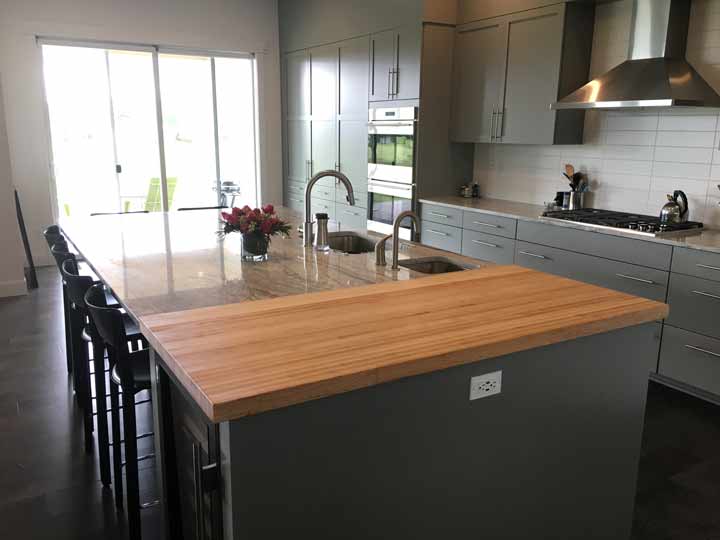
Shellac Finish: Shellac is a natural resin that forms a durable, protective finish on maple butcher block countertops. It provides excellent moisture resistance and enhances the natural beauty of the wood with a warm, amber tone. Shellac finishes require multiple coats and periodic reapplication to maintain their protective properties.
Epoxy Resin Finish: Epoxy resin is a durable, waterproof finish that provides exceptional protection for maple butcher block countertops. It creates a thick, glossy coating that is resistant to scratches, stains, and heat. Epoxy resin finishes are popular for modern and industrial-style kitchens but require careful application and adequate ventilation due to their strong odor and potential toxicity.
Maintaining Finish: Regardless of the finish you choose for your maple butcher block countertops, proper maintenance is essential to preserve their beauty and longevity. Regular cleaning with a mild soap and water solution, followed by drying with a clean cloth, helps remove dirt, spills, and debris and prevents water damage.
Avoiding Harsh Cleaners: Avoid using harsh or abrasive cleaners on maple butcher block countertops, as they can damage the finish and wood surface. Stick to gentle, non-abrasive cleaners and avoid exposing the countertops to excessive moisture or heat, which can cause warping or discoloration.
Preventing Moisture Damage: Protect maple butcher block countertops from excessive moisture exposure by wiping up spills promptly and using trivets or hot pads to place hot cookware or appliances on the surface. Seal any gaps or seams in the countertop with an appropriate sealant to prevent water infiltration.
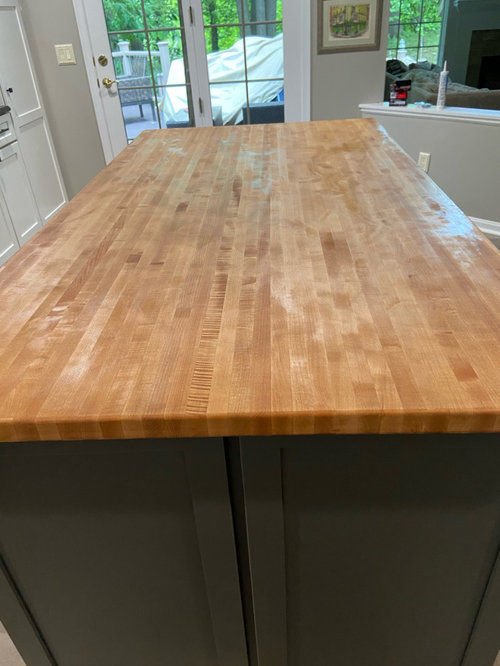
Regular Inspection: Periodically inspect maple butcher block countertops for signs of wear, damage, or deterioration, such as scratches, stains, or discoloration. Address any issues promptly to prevent further damage and preserve the integrity of the wood surface.
Reapplying Finish: Depending on the type of finish used, maple butcher block countertops may require periodic reapplication to maintain their protective properties. Follow the manufacturer’s recommendations for reapplication frequency and techniques to ensure optimal results.
Professional Refinishing: If your maple butcher block countertops show signs of significant wear or damage, consider hiring a professional refinishing service to restore their appearance and protectiveness. Professional refinishers can strip off old finishes, repair any damage, and apply a new finish to rejuvenate the countertops.
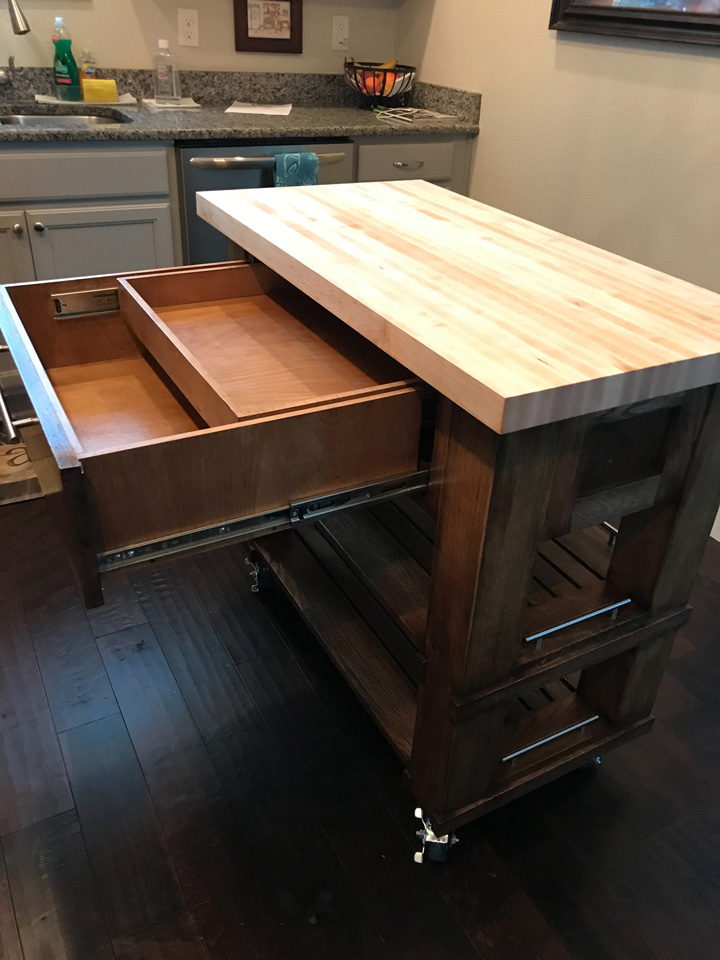
Common Mistakes to Avoid:
Neglecting Regular Maintenance: Neglecting to clean and maintain maple butcher block countertops regularly can lead to buildup, staining, or damage over time. Establish a routine cleaning schedule and follow recommended care guidelines to keep your countertops looking their best.
Using Improper Cleaning Products: Using harsh or abrasive cleaners on maple butcher block countertops can damage the finish and wood surface. Stick to gentle, non-abrasive cleaners specifically formulated for wood surfaces to prevent damage and maintain the integrity of the finish.
Skipping Sealing or Refinishing: Skipping sealing or refinishing of maple butcher block countertops leaves them vulnerable to moisture damage, staining, and wear. Follow manufacturer recommendations for sealing and refinishing frequency to protect the countertops and prolong their lifespan.
Ignoring Signs of Damage: Ignoring signs of damage or wear on maple butcher block countertops can lead to further deterioration and compromise the integrity of the wood surface. Address any issues promptly to prevent further damage and maintain the beauty and functionality of the countertops.
Exposing Countertops to Harsh Conditions: Exposing maple butcher block countertops to excessive moisture, heat, or harsh cleaning products can cause warping, discoloration, or damage to the wood surface. Take precautions to protect the countertops from harsh conditions and follow recommended care guidelines to preserve their appearance and durability.
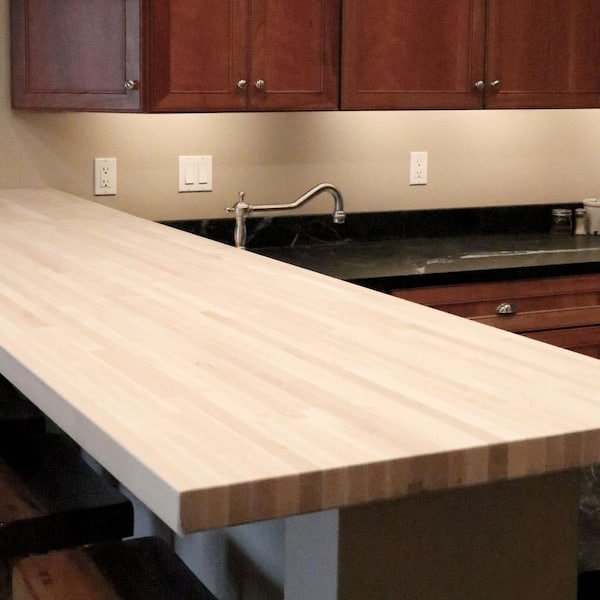
Can I use food on a sealed maple butcher block countertop?
Yes, maple butcher block countertops sealed with a food-safe finish, such as natural oil or beeswax, are safe for food preparation. Ensure that the finish is fully cured before using the countertop for food to prevent contamination.
How often should I reapply to finish to my maple butcher block countertop?
The frequency of refinishing or reapplying finish to maple butcher block countertops depends on factors such as usage, exposure to moisture, and the type of finish used. Follow manufacturer recommendations for reapplication frequency to maintain the protective properties of the finish.
Can I repair scratches or damage to my maple butcher block countertop?
Yes, minor scratches or damage to maple butcher block countertops can often be repaired using wood filler, sanding, and refinishing techniques. For more significant damage, consider hiring a professional refinishing service to restore the appearance and protectiveness of the countertop.
Is it safe to use bleach or harsh chemicals on maple butcher block countertops?
No, bleach or harsh chemicals can damage the finish and wood surface of maple butcher block countertops. Stick to gentle, non-abrasive cleaners specifically formulated for wood surfaces to prevent damage and maintain the integrity of the finish.
Can I use my maple butcher block countertop as a cutting surface?
While maple butcher block countertops are durable, it’s advisable to use cutting boards or protective mats when preparing food to prevent scratches and preserve the integrity of the wood surface. Avoid cutting or chopping directly on the countertop to prolong its lifespan and appearance.
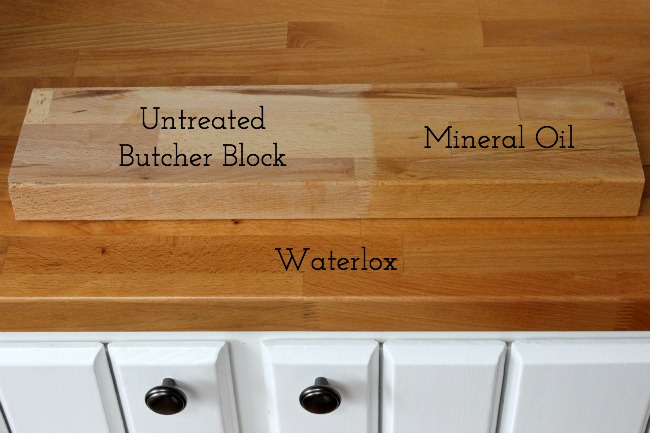
Big Leaf Maple – Butcher Block Countertop
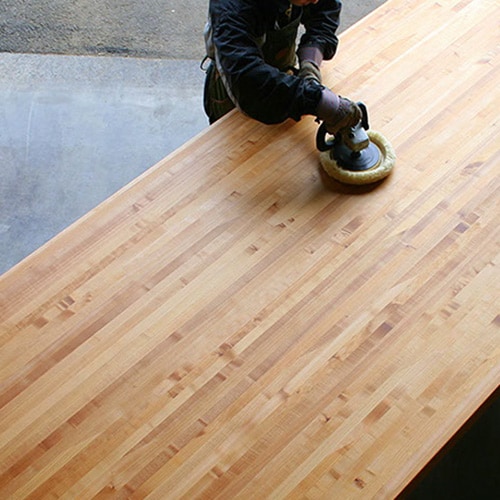
Sealing Butcher Block Countertops: Waterlox vs. Mineral Oil
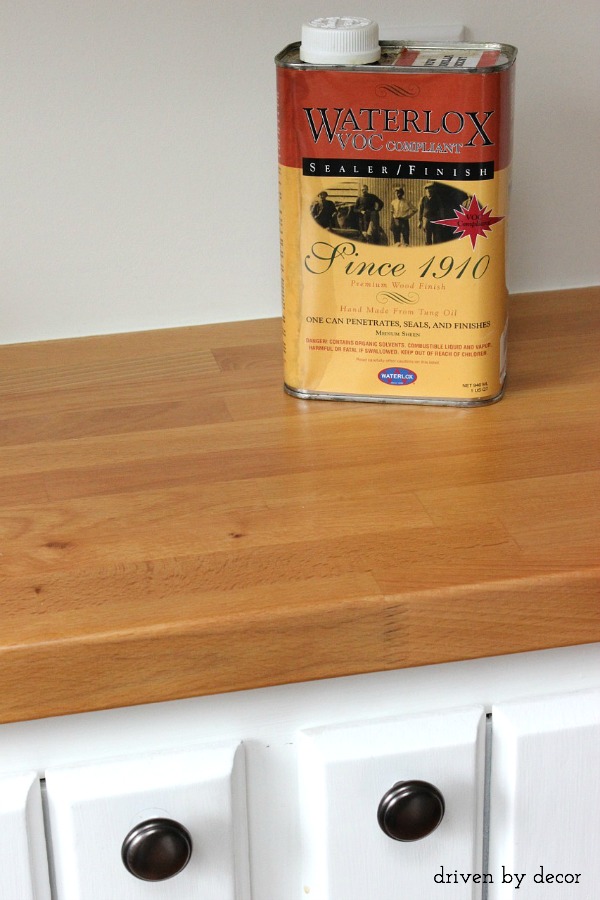
Hard Maple Butcher Block Countertops – J. Aaron

Maple Butcher Block Finishes ideas in 2024

Related articles:
- Butcher Block Countertop For Kitchen Island
- Can You Paint Butcher Block Countertops
- Butcher Block Countertops With White Cabinets
- Pine Butcher Block Countertops
- Butcher Block Countertops Walnut
- Maple Butcher Block Countertops
- Care Of Butcher Block Countertop
- Butcher Block Countertops Maintenance
- Antique Butcher Block Countertops
- Butcher Block Countertop Sealing
Introduction
Achieving a beautiful, functional finish on a maple butcher block countertop is a great way to add a timeless element to your kitchen. The warm tones and subtle grain of the hardwood create an inviting and classic atmosphere. Maple is also one of the most durable and affordable options available, making it perfect for a high-traffic area like the kitchen. With proper care, this type of countertop can last for many years. In this article, we will discuss the different types of finishes, pros and cons, installation tips, and how to care for your maple butcher block countertop.
Types of Finishes
There are many types of finishes available for a maple butcher block countertop. The most popular options include oil finishes, varnishes, and polyurethane coatings. Each finish has its own unique benefits and drawbacks.
Oil Finish
Oil finishes are the most common type of finish for a maple butcher block countertop. This type of finish soaks into the wood, creating a beautiful and natural look that brings out the grain of the wood. It is also relatively easy to apply and maintain. However, an oil finish may require more frequent reapplication than other types of finishes.
Varnishes
Varnishes provide a hard and durable finish that can be easily wiped down with a damp cloth. This type of finish is often used in commercial kitchens as it is very resilient against wear and tear. Varnish is also water resistant, making it great for areas around sinks or in areas where moisture may be present. The downside is that varnishes can be difficult to apply correctly due to their thickness and may require multiple coats for proper coverage.
Polyurethane Coatings
Polyurethane coatings are a popular choice for countertops as they provide excellent protection against scratches and dents while still allowing for a natural look to the wood grain. This type of finish is also fairly easy to apply and maintain as it does not require frequent reapplication like oil finishes do. However, polyurethane coatings can be more expensive than other types of finishes.
Pros & Cons
When deciding which type of finish to use on your maple butcher block countertop, there are several pros and cons to consider.
Pros:
• Easy to apply and maintain
• Provides protection against wear and tear
• Natural look that brings out the grain of the wood
• Resistant to moisture
• Durable and long-lasting
Cons:
• Can be expensive depending on the type of finish used
• Some types may require frequent reapplication
Installation Tips
When installing your maple butcher block countertop, it is important to make sure it is level and secure before applying any type of finish. It is best to have a professional install your countertop for optimal results. Once your countertop is installed properly, you can then begin applying your chosen finish. Be sure to follow all instructions carefully when applying any type of finish as incorrect application can result in an uneven or patchy appearance.
Care & Maintenance
No matter which type of finish you choose for your maple butcher block countertop, regular care and maintenance are essential for maintaining its beauty. It is important to clean your countertop regularly with a mild soap and warm water to remove any dirt or spills that may occur during everyday use. You should also make sure to reapply any oil finishes or varnishes as needed to keep your countertop looking its best over time.
Where To Buy
If you’re looking for a quality maple butcher block countertop, there are many reputable retailers both online and in-store that offer a variety of options at competitive prices. Before making your purchase, make sure you check reviews from other customers to ensure you’re getting a high-quality product that will last for years to come.
Common Questions & Answers
Q: What is the best type of finish for a maple butcher block countertop?
A: The best type of finish depends on your personal preference as well as budget and maintenance needs. Popular options include oil finishes, varnishes, and polyurethane coat